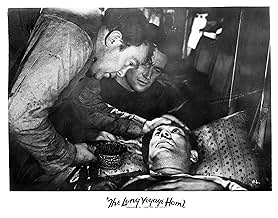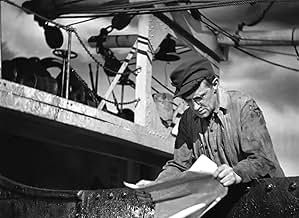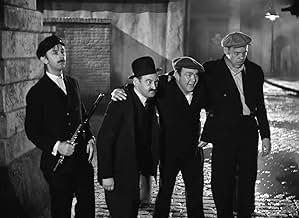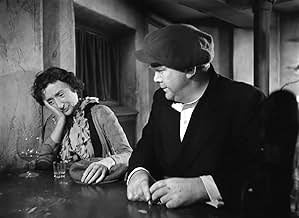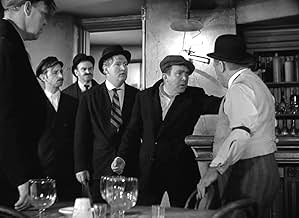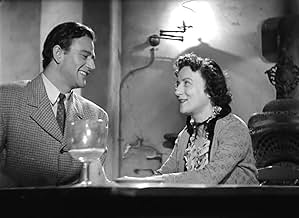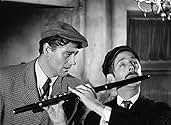PUNTUACIÓN EN IMDb
6,9/10
5,3 mil
TU PUNTUACIÓN
En 1940, la tripulación del barco de vapor SS Glencairn prepara la nave para viajar de las Indias Occidentales a Baltimore, y de ahí a Inglaterra.En 1940, la tripulación del barco de vapor SS Glencairn prepara la nave para viajar de las Indias Occidentales a Baltimore, y de ahí a Inglaterra.En 1940, la tripulación del barco de vapor SS Glencairn prepara la nave para viajar de las Indias Occidentales a Baltimore, y de ahí a Inglaterra.
- Dirección
- Guión
- Reparto principal
- Nominado para 6 premios Óscar
- 8 premios y 7 nominaciones en total
Wilfrid Lawson
- Captain
- (as Wilfred Lawson)
Joe Sawyer
- Davis
- (as Joseph Sawyer)
Constant Franke
- Norway
- (as Constant Frenke)
David Hillary Hughes
- Scotty
- (as David Hughes)
Reseñas destacadas
I was expecting this film about a tramp steamer with a cargo of high explosives to be a wartime drama along the lines of "San Demetrio"; in fact, the war is pretty peripheral. Even when the ship does come under attack, somewhere around the middle of the picture, she apparently escapes unscathed via means unspecified (did the enemy simply run out of bombs after missing with all of them?) It's really a story about life on the lower decks, with the officers making distant appearances and the wartime background intruding from time to time, but with the main focus on the relationships among the crew.
According to the credits, it was adapted from a set of "sea plays" by Eugene O'Neill, which accounts for the very episodic feel of the film. It's not really a complete story; it's a set of individual isolated incidents, some of which are never really explained (all the signalling with torches, for instance, which is apparently not anything to do with undercover spies -- I actually assumed there were two ships in the opening scene, one being the tramp steamer and the other a British naval vessel!) On the other hand, it did succeed in several places in making me care about the characters; I was convinced that Smitty was being falsely accused, and desperate by the end for Ole to escape successfully from seaboard life as his shipmates are determined that he should do, despite the heavy foreshadowing otherwise.
The film was billed as "John Wayne in Eugene O'Neill's The Long Voyage Home", but that's presumably a retrospective attempt to cash in on Wayne's name; the lead actors are Thomas Mitchell as the burly Irishman Driscoll, and Ian Hunter as the middle-class Englishman who is the odd one out among his cheery companions. John Wayne plays Ole, the simple Swedish farmboy whose role is largely passive and monosyllabic, though he gets a good scene where he talks nostalgically about his home during the final drunken bar-crawl.
There are no very great surprises here, and the pace is quite slow -- extremely slow at the beginning, which is presumably intended to indicate the heat and tedium of a tropical night. I can see these individual 'episodes' working better in the original format as one-act plays, each with its definitive ending, than as an attempt at one continuing story. I didn't find the film quite successful (not nearly so much so as the English production "San Demetrio, London"), but on the other hand, it's not entirely mediocre -- and it's not as gung-ho as an actual war film would probably have been. (The shadowy role of the war is explained, in retrospect, by the fact that the source material was written twenty years earlier!)
I'd probably rate it 7/10: worth taping from TV, not worth paying for :-p
According to the credits, it was adapted from a set of "sea plays" by Eugene O'Neill, which accounts for the very episodic feel of the film. It's not really a complete story; it's a set of individual isolated incidents, some of which are never really explained (all the signalling with torches, for instance, which is apparently not anything to do with undercover spies -- I actually assumed there were two ships in the opening scene, one being the tramp steamer and the other a British naval vessel!) On the other hand, it did succeed in several places in making me care about the characters; I was convinced that Smitty was being falsely accused, and desperate by the end for Ole to escape successfully from seaboard life as his shipmates are determined that he should do, despite the heavy foreshadowing otherwise.
The film was billed as "John Wayne in Eugene O'Neill's The Long Voyage Home", but that's presumably a retrospective attempt to cash in on Wayne's name; the lead actors are Thomas Mitchell as the burly Irishman Driscoll, and Ian Hunter as the middle-class Englishman who is the odd one out among his cheery companions. John Wayne plays Ole, the simple Swedish farmboy whose role is largely passive and monosyllabic, though he gets a good scene where he talks nostalgically about his home during the final drunken bar-crawl.
There are no very great surprises here, and the pace is quite slow -- extremely slow at the beginning, which is presumably intended to indicate the heat and tedium of a tropical night. I can see these individual 'episodes' working better in the original format as one-act plays, each with its definitive ending, than as an attempt at one continuing story. I didn't find the film quite successful (not nearly so much so as the English production "San Demetrio, London"), but on the other hand, it's not entirely mediocre -- and it's not as gung-ho as an actual war film would probably have been. (The shadowy role of the war is explained, in retrospect, by the fact that the source material was written twenty years earlier!)
I'd probably rate it 7/10: worth taping from TV, not worth paying for :-p
An expressionistic classic featuring John Wayne as a Swede? Can it be?
"The Long Voyage Home" may fall just short of classic status, but it is one of Hollywood's most visually expressionistic films, a tone poem of shadow and light presented by director John Ford and cinematographer Gregg Toland. That is indeed the Duke himself, John Wayne, playing a Swedish hayseed named Ole Olsen who the other sailors aboard his ship want to see safely en route to home. He's not Meryl Streep as it turns out, but you will want to see this powerhouse example of Hollywood art anyway for Toland's camera-work, the ensemble acting, and Dudley Nichols' seamless adaptation of Eugene O'Neill's four one-act plays.
O'Neill's sea yarns are transported to the then-present. World War II is underway, and the Glencairn transports ammunition to England for the fight against Hitler. Will Ole return home? What is the secret behind quiet English sailor Smitty (Ian Hunter)? Why are women bearing baskets of fruit not to be trusted? Why is Driscoll (Thomas Mitchell) so suspicious of that bartender?
Pauline Kael once wrote up "Long Voyage Home" by way of addressing another film shot by Gregg Toland the following year, "Citizen Kane." Both Ford and "Kane" director Orson Welles took the unusual step of sharing their titles card with Toland, a show of respect for what Toland's eye brought to their films. I'd say Toland brought more to "Long Voyage Home" than he did to "Kane," as every shot seems suffused with a tenseness and mood that at the very least speaks as eloquently to the drama on screen as any line of dialogue or actor's performance.
That's true from the opening shot, a wordless pan shot of the Glencairn drifting across the water as women in the foreground gyrate sensuously to an unseen music. The images are contrasted with those of Glencairn sailors looking pent-up and frustrated. Are the women really there on the shore, or just being imagined by the crew? It's a classic bit of expressionist ambiguity that, once established, carries through for the rest of the film.
Take the case of Smitty, a fellow who no one can much figure out as he keeps to himself, at least until he is finally fingered as a likely German spy in a sequence that might appear contrived had not Nichols, Toland, and Hunter made it quite diabolically real. Ian Hunter is not a well-known actor today, but he carries the film as long as he's around, especially while confronted with his apparent treachery. Watching him grimace and shake with fury as his secret is slowly, gut-wrenchingly exposed is the strongest scene in this very strong film, and once the film moves beyond Smitty, it never quite recovers. Hunter also appears in "Adventures Of Robin Hood" as a similar figure of dual identities, and I won't make the mistake of underestimating him again.
I only wish Thomas Mitchell, the Oscar winner from Ford's "Stagecoach" the previous year, had brought some restraint to his playing of Driscoll here. Barry Fitzgerald and John Qualen, Ford vets both, seem to catch his overacting bug. It's not pretty, especially to those of us who have seen all three give better work.
Wayne, however, is effective despite his dodgy accent, and it's interesting to see him in a film, just a year after his breakthrough in "Stagecoach," where he is presented to us as one of the gang, something of a follower and not a lone-wolf leader. I don't normally associate Wayne with amiable go-alongness, but he carries it here.
John Ford is pretty much the Shakespeare of cinema, effortlessly moving from comedy to tragedy within a single scene, and "Long Voyage Home," while not perfect, makes a strong case for his visionary mastery.
"The Long Voyage Home" may fall just short of classic status, but it is one of Hollywood's most visually expressionistic films, a tone poem of shadow and light presented by director John Ford and cinematographer Gregg Toland. That is indeed the Duke himself, John Wayne, playing a Swedish hayseed named Ole Olsen who the other sailors aboard his ship want to see safely en route to home. He's not Meryl Streep as it turns out, but you will want to see this powerhouse example of Hollywood art anyway for Toland's camera-work, the ensemble acting, and Dudley Nichols' seamless adaptation of Eugene O'Neill's four one-act plays.
O'Neill's sea yarns are transported to the then-present. World War II is underway, and the Glencairn transports ammunition to England for the fight against Hitler. Will Ole return home? What is the secret behind quiet English sailor Smitty (Ian Hunter)? Why are women bearing baskets of fruit not to be trusted? Why is Driscoll (Thomas Mitchell) so suspicious of that bartender?
Pauline Kael once wrote up "Long Voyage Home" by way of addressing another film shot by Gregg Toland the following year, "Citizen Kane." Both Ford and "Kane" director Orson Welles took the unusual step of sharing their titles card with Toland, a show of respect for what Toland's eye brought to their films. I'd say Toland brought more to "Long Voyage Home" than he did to "Kane," as every shot seems suffused with a tenseness and mood that at the very least speaks as eloquently to the drama on screen as any line of dialogue or actor's performance.
That's true from the opening shot, a wordless pan shot of the Glencairn drifting across the water as women in the foreground gyrate sensuously to an unseen music. The images are contrasted with those of Glencairn sailors looking pent-up and frustrated. Are the women really there on the shore, or just being imagined by the crew? It's a classic bit of expressionist ambiguity that, once established, carries through for the rest of the film.
Take the case of Smitty, a fellow who no one can much figure out as he keeps to himself, at least until he is finally fingered as a likely German spy in a sequence that might appear contrived had not Nichols, Toland, and Hunter made it quite diabolically real. Ian Hunter is not a well-known actor today, but he carries the film as long as he's around, especially while confronted with his apparent treachery. Watching him grimace and shake with fury as his secret is slowly, gut-wrenchingly exposed is the strongest scene in this very strong film, and once the film moves beyond Smitty, it never quite recovers. Hunter also appears in "Adventures Of Robin Hood" as a similar figure of dual identities, and I won't make the mistake of underestimating him again.
I only wish Thomas Mitchell, the Oscar winner from Ford's "Stagecoach" the previous year, had brought some restraint to his playing of Driscoll here. Barry Fitzgerald and John Qualen, Ford vets both, seem to catch his overacting bug. It's not pretty, especially to those of us who have seen all three give better work.
Wayne, however, is effective despite his dodgy accent, and it's interesting to see him in a film, just a year after his breakthrough in "Stagecoach," where he is presented to us as one of the gang, something of a follower and not a lone-wolf leader. I don't normally associate Wayne with amiable go-alongness, but he carries it here.
John Ford is pretty much the Shakespeare of cinema, effortlessly moving from comedy to tragedy within a single scene, and "Long Voyage Home," while not perfect, makes a strong case for his visionary mastery.
A strange, episodic film about a group of seamen who are charged with transporting munitions from a tropical port to England to help the British war effort.
These men aren't in the military themselves, which puts them in a sort of limbo. Though their mission is driven by the war, and their lives will be in danger from German U-boats prowling the sea they have to pass through, the war itself is only a vague specter in their actual lives, which are much more concerned with personal emotions and motives: homesickness being the primary one. The movie could serve as a representation for America as a country at the time of the film's release -- not directly involved in a war that one way or another was going to have a huge impact on it regardless.
John Ford gives the film a melancholy and even rather eerie vibe, helped in no small part by Gregg Toland's cinematography. But I can't say I ever really warmed to the film. Its episodic nature starts to feel monotonous after a while. We just start to learn something about a character and then the narrative moves along to yet another long drunken fistfight. Something about the movie remains deeply unsatisfying, even if one can appreciate the artistry that went into it.
John Wayne is now given top billing for this film, but he's part of a large ensemble cast without a real star. And oh my goodness, no one should have asked him to try a Swedish accent.
"The Long Voyage Home" was nominated for six Oscars, though it went home empty handed: Outstanding Production, Best Screenplay (Dudley Nichols), Best Cinematography (B&W), Best Film Editing (Sherman Todd), Best Original Score (Richard Hageman), and Best Special Effects (R.T. Layton, R.O. Binger, and Thomas T. Moulton).
Grade: B
These men aren't in the military themselves, which puts them in a sort of limbo. Though their mission is driven by the war, and their lives will be in danger from German U-boats prowling the sea they have to pass through, the war itself is only a vague specter in their actual lives, which are much more concerned with personal emotions and motives: homesickness being the primary one. The movie could serve as a representation for America as a country at the time of the film's release -- not directly involved in a war that one way or another was going to have a huge impact on it regardless.
John Ford gives the film a melancholy and even rather eerie vibe, helped in no small part by Gregg Toland's cinematography. But I can't say I ever really warmed to the film. Its episodic nature starts to feel monotonous after a while. We just start to learn something about a character and then the narrative moves along to yet another long drunken fistfight. Something about the movie remains deeply unsatisfying, even if one can appreciate the artistry that went into it.
John Wayne is now given top billing for this film, but he's part of a large ensemble cast without a real star. And oh my goodness, no one should have asked him to try a Swedish accent.
"The Long Voyage Home" was nominated for six Oscars, though it went home empty handed: Outstanding Production, Best Screenplay (Dudley Nichols), Best Cinematography (B&W), Best Film Editing (Sherman Todd), Best Original Score (Richard Hageman), and Best Special Effects (R.T. Layton, R.O. Binger, and Thomas T. Moulton).
Grade: B
The Long Voyage home is not a typical film from this period. It differs in that it focuses on an ensemble cast instead of on a star. That's common nowadays, but not back then. Ford's Stagecoach, made the previous year, had quite an ensemble cast, but the film was always focused on Ringo and Dallas. Here, John Wayne is just one of the stars. Thomas Mitchell, who played Doc Washburn in Stagecoach, has a role that's as big as Wayne's in Voyage. Others are as prominent.
The plot is also pretty tenuous and episodic. And, unlike most films of the time, the focus was not on a goal, but just on the events and lives of the seaman aboard the Glencairn. We see them sail through the war-torn Atlantic, between the U.S. and Europe. They have fun, they fight, they talk about home. It's all rather gentle and beautiful, very subtle. The script is great, which is probably due to Eugene O'Neil, for of whose plays this film is based on (they are blended together seamlessly).
The actors are marvelous. Mitchell and Wayne are probably the best known, but there are also Ian Hunter, Barry Fitzgerald, John Qualen, Ward Bond, Mildred Natwick, and many other great character actors. John Wayne was probably the draw, considering how popular Stagecoach had made him, but, as I said, his role is not out in the front. In fact, he doesn't have many lines. His schtick is that he is a Swede who can't speak English well, so he is generally pretty quiet (Wayne can't muster the best Swedish accent, either, so that's kind of a good thing!). He has one great scene where he has some long bits of dialogue. But even without the dialogue, he emotes so well in his face. I knew his character intimately by the end of the film. We don't often think of Wayne as a great actor, but he certainly was. Although The Searchers probably contains his best role, The Long Voyage Home would certainly be worth a major mention when talking about his career.
If you could say that there is a single "star" of this film, that would have to be Greg Tolland. Of course, he photographed Citizen Kane in the next year, as well as Ford's Best Picture winning How Green Was My Valley and The Grapes of Wrath. The cinematography is some of the most impressive to be found in the American cinema. John Ford himself is just as much the star of The Long Voyage Home. He definitely put his heart into this one. The direction is beautiful, artful. It is as good here as it is in The Grapes of Wrath, My Darling Clementine, and The Searchers, that is, it is one of his very best films, if not THE best. To date, it's the only Ford film that made me shed tears. 10/10.
The plot is also pretty tenuous and episodic. And, unlike most films of the time, the focus was not on a goal, but just on the events and lives of the seaman aboard the Glencairn. We see them sail through the war-torn Atlantic, between the U.S. and Europe. They have fun, they fight, they talk about home. It's all rather gentle and beautiful, very subtle. The script is great, which is probably due to Eugene O'Neil, for of whose plays this film is based on (they are blended together seamlessly).
The actors are marvelous. Mitchell and Wayne are probably the best known, but there are also Ian Hunter, Barry Fitzgerald, John Qualen, Ward Bond, Mildred Natwick, and many other great character actors. John Wayne was probably the draw, considering how popular Stagecoach had made him, but, as I said, his role is not out in the front. In fact, he doesn't have many lines. His schtick is that he is a Swede who can't speak English well, so he is generally pretty quiet (Wayne can't muster the best Swedish accent, either, so that's kind of a good thing!). He has one great scene where he has some long bits of dialogue. But even without the dialogue, he emotes so well in his face. I knew his character intimately by the end of the film. We don't often think of Wayne as a great actor, but he certainly was. Although The Searchers probably contains his best role, The Long Voyage Home would certainly be worth a major mention when talking about his career.
If you could say that there is a single "star" of this film, that would have to be Greg Tolland. Of course, he photographed Citizen Kane in the next year, as well as Ford's Best Picture winning How Green Was My Valley and The Grapes of Wrath. The cinematography is some of the most impressive to be found in the American cinema. John Ford himself is just as much the star of The Long Voyage Home. He definitely put his heart into this one. The direction is beautiful, artful. It is as good here as it is in The Grapes of Wrath, My Darling Clementine, and The Searchers, that is, it is one of his very best films, if not THE best. To date, it's the only Ford film that made me shed tears. 10/10.
The Long Voyage Home is a compilation film of four one act plays by Eugene O'Neill who some will argue is America's greatest dramatist. The man who did the stitching together of O'Neill's work about the crew of the S.S. Glencairn is Dudley Nichols and presiding over it all is the direction of John Ford.
Mr. Ford is usually someone who really puts an individual stamp on one of his movies. But the usual Ford trademarks are noticeably absent from The Long Voyage Home. Probably in mood and style the film of Ford's this comes closest to is The Informer. In fact J.M. Kerrigan is playing almost the same part in this as he did in The Informer.
One thing Ford always did was use the right kind of music to set the tone for a film. Those 19th century ballads like I Dream of Jeannie that work so well in something like Stagecoach are substituted for Harbor Lights. That song expresses so well the longing of a whole bunch of rootless men to find some kind of stability in their lives.
Eugene O'Neill spent many years at sea and the characters of these men on the S.S. Glencairn are drawn from his own youthful experience. Most of our planet is covered by water and no country owns it. It's just called the high seas and the seamen on it are an international fraternity, like the S.S. Glencairn crew. I've always felt that O'Neill was trying to say that if there's any salvation to be had in this old world, it's to be found on the salt water. It's the only place where all kinds of people really work for a common goal, stay alive and make the trip.
The original plays had a World War I background, but it has been updated for World War II. Especially in the part when the crew becomes convinced that Ian Hunter is some kind of spy. Certainly the second World War in 1940 gave the audiences some real interest. Ian Hunter may have given his career performance in this as Smitty. Turns out he's far from what everyone suspects.
Hard to believe that John Wayne would be in a film by one of our greatest dramatists. But the Duke holds his own in the ensemble. It's the only time he ever attempted some kind of accent and he pulls it off. But I'm sure he thought once was enough.
Wayne as Olsen is the innocent of the group, maybe the only time he's ever been that on the screen. The rest of the crew makes every effort to see he does in fact get home to Sweden. It turns out to cost one of them his life ultimately.
If you're any kind of depressed, The Long Voyage Home or any Eugene O'Neill is not good for your mental health. He's one pessimistic fellow that O'Neill. But his insights into our character and soul are always penetrating as they are in The Long Voyage Home.
Mr. Ford is usually someone who really puts an individual stamp on one of his movies. But the usual Ford trademarks are noticeably absent from The Long Voyage Home. Probably in mood and style the film of Ford's this comes closest to is The Informer. In fact J.M. Kerrigan is playing almost the same part in this as he did in The Informer.
One thing Ford always did was use the right kind of music to set the tone for a film. Those 19th century ballads like I Dream of Jeannie that work so well in something like Stagecoach are substituted for Harbor Lights. That song expresses so well the longing of a whole bunch of rootless men to find some kind of stability in their lives.
Eugene O'Neill spent many years at sea and the characters of these men on the S.S. Glencairn are drawn from his own youthful experience. Most of our planet is covered by water and no country owns it. It's just called the high seas and the seamen on it are an international fraternity, like the S.S. Glencairn crew. I've always felt that O'Neill was trying to say that if there's any salvation to be had in this old world, it's to be found on the salt water. It's the only place where all kinds of people really work for a common goal, stay alive and make the trip.
The original plays had a World War I background, but it has been updated for World War II. Especially in the part when the crew becomes convinced that Ian Hunter is some kind of spy. Certainly the second World War in 1940 gave the audiences some real interest. Ian Hunter may have given his career performance in this as Smitty. Turns out he's far from what everyone suspects.
Hard to believe that John Wayne would be in a film by one of our greatest dramatists. But the Duke holds his own in the ensemble. It's the only time he ever attempted some kind of accent and he pulls it off. But I'm sure he thought once was enough.
Wayne as Olsen is the innocent of the group, maybe the only time he's ever been that on the screen. The rest of the crew makes every effort to see he does in fact get home to Sweden. It turns out to cost one of them his life ultimately.
If you're any kind of depressed, The Long Voyage Home or any Eugene O'Neill is not good for your mental health. He's one pessimistic fellow that O'Neill. But his insights into our character and soul are always penetrating as they are in The Long Voyage Home.
¿Sabías que...?
- CuriosidadesBarry Fitzgerald, who plays the character of Cocky, and Arthur Shields, who played Donkeyman, were brothers in real life. They also appeared together in director John Ford's El hombre tranquilo (1952).
- PifiasAt the beginning of the film, when Driscoll sneaks back to the ship, he jumps from a rowboat into the water and climbs up the anchor chain. The next time onscreen, he appears dry from head to toe.
- ConexionesFeatured in Film Preview: Episodio #1.2 (1966)
- Banda sonoraBlow the Man Down
(uncredited)
Traditional
Played during the opening credits
Sung often by crewmen
Sung a cappella by J.M. Kerrigan
Variations played as part of the score
Selecciones populares
Inicia sesión para calificar y añadir a tu lista para recibir recomendaciones personalizadas
- How long is The Long Voyage Home?Con tecnología de Alexa
Detalles
- Fecha de lanzamiento
- País de origen
- Idiomas
- Títulos en diferentes países
- El retorn a casa
- Localizaciones del rodaje
- Los Angeles Harbor, Wilmington, Los Ángeles, California, Estados Unidos(scenes on S.S. Munami)
- Empresas productoras
- Ver más compañías en los créditos en IMDbPro
Taquilla
- Presupuesto
- 682.495 US$ (estimación)
- Duración
- 1h 45min(105 min)
- Color
- Relación de aspecto
- 1.37 : 1
Contribuir a esta página
Sugerir un cambio o añadir el contenido que falta

